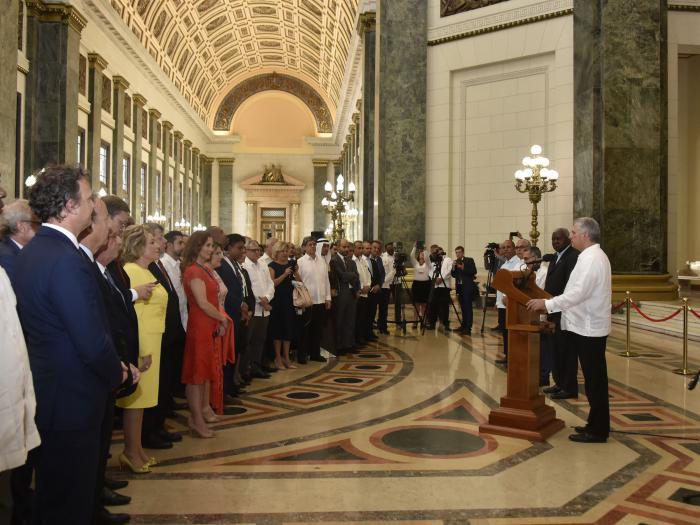
Speech by President of the Republic of Cuba Miguel Díaz-Canel Bermúdez, at the Capitol, during the official welcome for international guests attending celebrations for the 500th anniversary of Havana, November 16, 2019, Year 61 of the Revolution:
Dear friends who have come from so many corners of the earth to salute the 500 years of our beloved capital:
Half a millennium ago, the town of San Cristóbal de La Habana was founded here, which since then has become a point of arrival and departure, meeting and permanence in this world that those who did not know it called new. But they named it well, because there is always something surprising on this side of the Atlantic, where our archipelago is a key and a bridge, a door or a wall, depending on who arrives and with what motivation they arrive. Open, hospitable, friendly, and supportive for friends. Closed, impassable, invincible for those who attempt to subjugate.
Numerous heads of state and government, kings, princes, ministers, and artistic personalities, literary figures, creators of all disciplines, and representatives from the most diverse regions and political views, have touched Havana history by becoming protagonists and witnesses of Cuba’s noble ecumenical vocation. Three Catholic popes have also visited us in the last 20 years: John Paul II, Benedict XVI, and Francis, as well as Patriarch Kirill of the Orthodox Church of all Russia.
In 2016, in a historic meeting that ended a thousand-year-old schism took place here, between the highest authorities of two branches of Christianity: the Catholic Church and the Orthodox Church. Then Pope Francis said that Havana was on its way to being the Capital of Unity.
It is a just title for the city previously named a World Heritage Site, and more recently a Wonder City, and which many also recognize as a city of peace, since the Proclamation of Latin America and the Caribbean as a Zone of Peace was signed here in 2014.
And we say this with pride, but also with pain, at a time when instability, crisis, and uncertainty reign in different parts of the world and in our own region. When our celebration, imagined and conceived with such emotion and joy, is accompanied by the bitter taste of a coup in a sister nation, where right now, facing harassment and threats are our doctors and health workers, missionaries of life, who have only love to oppose hate.
We look to the future from the past, which we commemorate today, because memory is the fundamental basis of human spirituality. The Havana that welcomes you offers an accumulation of multiple cultural contributions, rebellion and resistance, and milestones that have impacted the history of humanity.
In our bay, the battleship Maine was exploded, a pretext to launch the first war of modern imperialism. Along the bustling Malecon, the Caravan of Freedom entered bearing the Cuban Revolution, with Comandante en jefe Fidel Castro in front.
On one of our most emblematic corners, 23rd and 12th, Cuba declared itself the first socialist state in the Western Hemisphere, and all along the Havana coastline, images forever immortalize an army of boys defending our sovereignty in “the bright and sad days of the Caribbean Crisis.”
And in José Martí Plaza de la Revolución, the political and administrative heart of the country, there have been popular demonstrations that figure among the most massive in the world, including those for the First and Second Declarations of Havana, in defense of sovereignty, independence, and national dignity.
This city is the birthplace and home of world-renowned Cubans such as Felix Varela, José Martí, Carlos Juan Finlay, José Raúl Capablanca, Bola de Nieve, Alejo Carpentier, Alicia Alonso, and an infinite list of other creators born elsewhere, but based here, to be nurtured by the sensation that we as a nation are blessed by a number of men and women of extraordinary values, who feel the special pride of calling themselves Cuban.
Our Havana has hosted two Summits of the Non-Aligned Movement, an Ibero-American Summit, a Group of 77 plus China Summit, and a Community of Latin American and Caribbean States Summit.
Countless bilateral and multilateral agreements that have impacted international relations have been signed here. And here were the first, historic, heartfelt meetings between Fidel and Chavez, from which the agreements for the creation of ALBA-TCP would be born, a paradigmatic integration project that will reach its 15th anniversary in December.
The University of Havana, alma mater of Higher Education in Cuba stands on one of our hills. A city of science, dance, cinema, literature, of important sporting, cultural, friendship, and solidarity events with the peoples of Africa, Asia, and Latin America, Havana can also be considered today an example of resistance against neoliberalism and imperialism, a meeting point for all those in the world who defend justice and true democracy, democracy that contemplates the fate of the poor of the earth and not only of economically powerful elites, and also of all who believe that a better world is possible, without interference or imperial domination.
We cannot overlook reaffirming today: this has also been, for the last 60 years, the city of dignity, a bastion of resistance to the longest, most unjust, and genocidal blockade that has ever been imposed on an entire people by a powerful empire.
Havana, beautiful, and modest, as you have already seen, is hospitable and safe for its citizens and all who visit and learn to understand its unique and admirable way of being, and making those who love it happy.
Welcome again, dear friends, and thank you for joining us for the 500th anniversary celebrations of our beloved capital.











